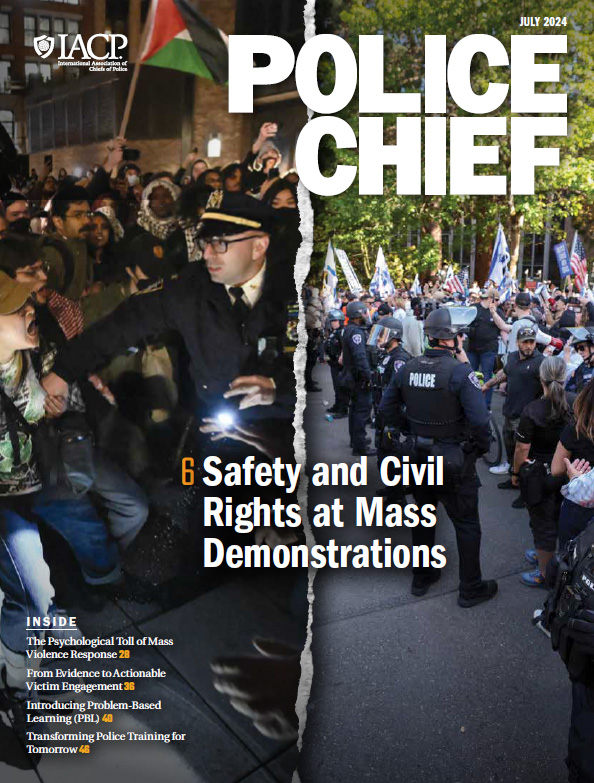
Victim-centered responses and services are vital to the safety, stability, and healing of crime victims, as their use reduces and prevents future victimization.
Many law enforcement agencies attempt to address victim needs but lack the time, resources, and expertise needed to develop robust victim-centered approaches or expand victim services units. The Law Enforcement Management and Administrative Statistics Survey reported that, from 2003 to 2013, the number of local law enforcement agencies employing 100 or more sworn personnel that have a full-time victim services unit increased only slightly from 33 percent to 36 percent. Even a minimal increase is an important first step and signals the potential for growth within law enforcement–based victim services.
The IACP is proud to serve as the training and technical assistance (TTA) provider for the Law Enforcement-Based Direct Victim Services and Technical Assistance Program (LEV Program). Sponsored by the U.S. Department of Justice, Office for Victims of Crime (OVC), this project seeks to increase the number of victim services programs in state, local, and tribal law enforcement organizations and expand partnerships with community-based programs to serve the broader needs and rights of all crime victims.
Under the Fiscal Year (FY) 2018 LEV Program, OVC funded 16 law enforcement jurisdictions as grantees. OVC released a second round of funding and awarded resources to an additional 36 law enforcement jurisdictions in FY 2019. There are now 52 state, local, and tribal law enforcement agencies actively using victim-centered approaches to develop or expand victim services units in their departments.
The IACP takes a three-pronged approach to TTA provision: (1) virtual trainings geared toward executive leadership and program staff; (2) topic-specific publications; and (3) in-person trainings through regional meetings and site visits. While these sites receive tailored TTA, OVC and IACP aspire to provide resources to the entire law enforcement field. Recognizing the gap of technical assistance available to advance the professional field of law enforcement–based victim services, the IACP plans to ensure that many of the LEV resources are openly accessible.
The IACP is pleased to announce the release of the first LEV Program publication entitled Establishing or Enhancing Law Enforcement-Based Victim Services—What Are the Key Considerations? Accompanying this document is the “Key Considerations Checklist” to assist agencies in assessing their strengths and areas for improvement. The following are the topics on the checklist:
■ Victims’ Rights – What federal and states’ rights exist? How are victims made aware?
■ Advocacy Parameters – What crime types are served? Where is the unit placed? Who supervises the advocacy staff?
■ Documentation – How is documentation handled? Have protocols been established for Brady disclosure, HIPAA, and FOIA?
■ Partnerships – Does cross-training occur with victim services personnel and other personnel (SWAT, property)? Are formal agreements established with community agencies?
■ Incorporating Victim Services into the Agency – Have victim services been incorporated into the department budget? Have victim services personnel been incorporated into department committees?
As the inaugural LEV Program document, the intent of Establishing or Enhancing Law Enforcement-Based Victim Services—What Are the Key Considerations? is to facilitate conversation within law enforcement agencies as they develop or enhance system-based victim services. Throughout the course of the LEV Program, subsequent publications will be released to expand on each section of the “Key Considerations” document.


